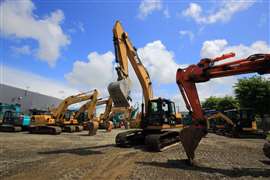Commission acknowledges construction's key role
17 June 2016
The construction sector's key role in the long-term challenges facing Europe has been acknowledged by European Commission Vice President Jyrki Katainen.
He was speaking at the opening of the annual congress of FIEC (the European Construction Industry Federation) in Brussels, Belgium, addressing, in particular, the Investment Plan for Europe (the Juncker Plan) one year on.
He spoke about the achievements of the plan and the role contractors can play in the scheme.
“The construction sector can play a key role in addressing long-term societal challenges that Europe faces,” said Katainen, mentioning jobs and growth, demographic changes, climate change, creating smart cities and resource sustainability.
FIEC said it approved of the extension and reinforcement of the Juncker Plan.
President Johan Willemen said that for it to play its role in the economy fully, it needed a stable investment strategy.
"No investment means no growth, no jobs and no future," he said. "And I’m talking both private and public investment here, as both are needed and are complementary.”
Willemen welcomed the positive preliminary outcomes of the Juncker Plan, especially as regards projects financed in the fields of priority sectors - energy, transport, environment and resource efficiency.
He also welcomed the progress made in terms of technical assistance and of improving the regulatory environment for private investors.
He warned, however, “The rationale of the investment plan is to mobilise private money. This is most needed, but many essential projects for EU competitiveness are not able to attract private money, as they do not offer interesting returns or any return at all for private investors. What happens then to the renovation and maintenance of our core assets?
"At some point, public money must also be mobilised and the Juncker Plan should also help out.”
Willemen concluded that, although ready to support the extension and reinforcement of the Investment Plan for Europe, FIEC recommended that the Commission implement several necessary measures for the overall success of a long-term investment strategy.
These include extending the “investment clause of the Stability & Growth Pact” in order to unleash public investment, and making sure that State aid rules did not interfere with projects financed under the EFSI (European Fund for Strategic Investments).
Other recommendations include safeguarding and reinforcing those EU budget lines which are successful in granting money to projects - for example the Connecting Europe Facility, and Horizon 2020.
FIEC called for the Commission to ensure that smaller construction projects - like new, renovation and maintenance - and consequently SMEs, could fully benefit from the Investment Plan, which FIEC said was barely the case as things stood now. It also said it wanted better connecting of the plan at regional level to make sure that its geographical coverage was well spread all over the EU.
Responding to Katainen’s call to raise awareness about the European Investment Project Portal and investment platforms at national and regional level, Willemen stressed, “The construction industry stands ready to accept the challenges ahead and play an active role in the further implementation of the Investment Plan.
"It is now up to public and private investors to contribute their part of the puzzle."






